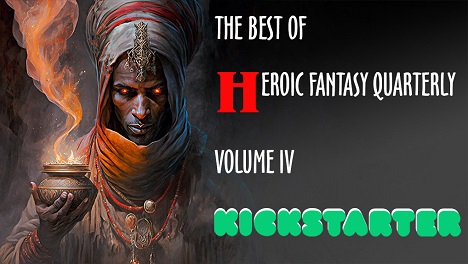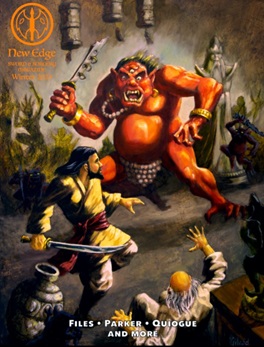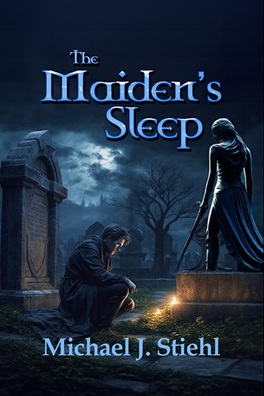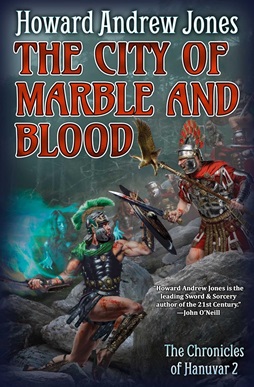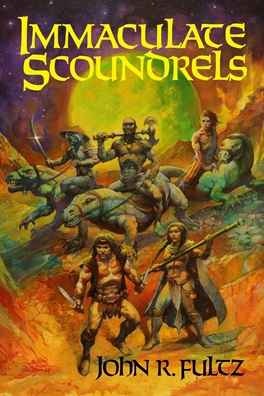THE LION AND THE THORN TREE
THE LION AND THE THORN TREE, by J.S. Bangs:
My husband’s voice came through the door of our house in the night. It was a ghost voice, muddled with the baying of wild dogs, and so I knew he was dead. I was four months pregnant.
I followed the echo of his voice for half the night until I reached the thorn tree. When I found him he had been beaten by Wuluju’s warriors and impaled on the thorns, his wrists and legs bound by leather thongs to the spiny branches. Vultures huddled in the tree’s crown. In haste I cut the knots and let his body fall. He was too heavy for me to carry, but I could not leave him. That thorn tree was an evil place, unhallowed by the sorcerer Wuluju’s magics and murders, and the ghost lion that he summoned to hunt there. So I stayed, swatting away the vultures that approached, until the sun broached the eastern horizon and burned away the night. I prayed for the aid of my mothers and grandmothers, but I did not think they heard me.
Just before dawn I heard the ghost lion roar for the first time. I wished then I could summon the lioness, as our mothers and grandmothers had done in the old days. But our ancestors had forgotten us, and the old magics had died. So I fled.
The sun was high when I finally returned to our village. Wuluju’s men had passed through earlier that morning boasting of my husband’s murder. I knew this, because the women of the village wouldn’t speak to me, honoring my rank as a widow. For a while I sat in the shade and listened to the krik-krik of locusts. You may think it strange that I didn’t cry. At a funeral a widow is expected to beat her breast and tear her clothes and crawl after the bier of her husband casting dirt onto her head. If there had been any funeral, I suppose I would have done all of that. But there had been no proper funerals for some months. Wuluju was afraid of the Nande lineage even in death, and he forbade them to be buried or mourned. Perhaps he thought they would return from the dead. But my husband was the last man of that name.
Yet not the last. I put my hand on my belly.
My nearest relatives were my half-brother and his wife in Kunante, eight days to the south. Wuluju’s empire was long settled in that region, but for that very reason his warriors there might be less vigilant. The thought of walking alone smothered me with dread, but I drove the feeling away.
I whispered to the old men of the village to find my husband’s body and bury it if they could, and set off that afternoon.
The roads were full of warriors and thieves, cut loose by the long war, so I followed the flood pan of the river to the south. I slept with my knife in my hand, the knife which had been a wedding present from my Nande sisters. Our troubles had already started when I wed, and they had taken to giving brides a knife of Madekkan steel in place of a hundred yards of red-dyed wool. I used to joke with my husband that he had married a scorpion rather than a woman, as I had no wool to weave, but I carried a sharp sting. He would smile and say, “All the Nande women have become scorpions these days.”
At the time I could not weep, so I weep now at the memory of my loneliness.
The lion roared at dusk during the ghost hour, when the moon and the sun mingled their light in the sky. This proved to me that it was no fleshly lion, and that it hunted me. A real lion will not follow the same prey for three days. A ghost will, though it must wait to attack until the ghost time when the moon is full. I had most of the month left to reach safety.
#
When I reached Kunante I found my half-brother’s home. The whitewash on the exterior had cracked and crumbled, a tattered curtain hung over the door, and the spirit niches were clogged with mud. I called out the names of my half-brother and his wife: “Dede! Kawaku!” No one responded. Then a shadow moved in the door, and the ratty curtain parted.
“Dede!” I ran and kissed my half-brother’s cheek. His skin was rough as a dried leaf, and he did not return my kiss. I saw no one in the house beside him. “Where is Kawaku?” I asked.
“Kawaku is dead.” He peered at me the way a man looks at an adder in the grass, then grunted. “Come in.”
The home’s interior had not fared better than the outside. There was a single bed laid on the ground and a few dusty gourds filled with salt and starch. Before the troubles, my brother had a rifle and an iron spearhead and a stack of hides ready for tanning, and the house was rich with food and Kawaku’s laughter. “What happened here?”
He told me: Wuluju demanded tribute of food and valuables even after the village was reduced to poverty, and his warriors had seized my brother’s rifle. Now the houses were all desolate, except for those where Wuluju’s lieutenants lived. The young women all gave themselves to Wuluju’s men, because who wanted to marry a poor man and starve with him? In the last dry season the food in Dede and Kawaku’s house had run out, and Kawaku fell sick with fever and died.
He said all of this in a flat, toneless voice like a dead man.
The news of Kawaku’s death wounded me like a thorn in the palm, yet I had my own wound to share. I told him that my husband was dead.
He shrugged as if he had expected the news, but his shoulders slumped a little. “Our hope is finally gone.”
“There is one thing,” I said. “I am carrying a child. I’m sure that it’s a boy.” I had been sure even before my husband had died, which is why I knew I was not merely wishing.
“We should go to the fortune teller,” my brother said. “To know for sure.”
“Is there one in this village?” Wuluju drove out most fortune tellers, for he was jealous of their power, and afraid. When he had first become a sorcerer and began to oppress the upriver country, a simple bone-caster had prophesied that a son of Nande would kill him. He had hunted and killed every Nande man after that, down to infants suckling at the breast.
“One. Her name is Gwana. We’ll have to go to her in the night.”
#
The nights in Kunante were quiet in a dead, uncanny way. I should have heard the chattering of birds and young men boasting around fires, but the villagers hid in their homes, and the birds had fled. Dede and I moved through the shadows like thieves. Dede whispered Gwana’s name at her window, and a husky voice bade us enter.
There was a low, red fire burning in hearth, making the hut very warm. It smelled of old smoke and burnt animal hair. Gwana crouched near the coals playing her fingers across her fetishes, a sour-faced woman with gray hair and flat breasts. “You have a child,” she said as soon as the curtain fell over the door.
“You have a good gift, Grandmother,” I said.
“Huh! You don’t need a gift to spot a girl flush with her first baby. How long?”
“Four months.”
Dede broke in. “Grandmother, she and her husband were of Nande’s lineage. Wuluju killed him. He was the last one.” It is important that I was also of Nande’s line, for when a name becomes weighty with power it can no longer be given by the father alone, but must come through the mother’s line as well. This is also why my half-brother was not Nande, though we shared a mother.
The red light made Gwana’s face look ghastly and severe. “So you hope for a good fortune? Foolish girl. There is no good fortune left for a woman like me to give. Our mothers and grandmothers have forgotten us.”
“Please, Grandmother. I want to know if I have a son, and if he will—”
She hushed me. “You are a fool. Come here.”
I knelt next to her. She held an oracle stone carved like a fat pregnant woman, which she passed over my breasts and belly muttering prayers. After she had done this several times she drew out the pouch of bones, shook it three times, and threw them across the hearth. Her breath hissed through her teeth as she looked over the heap. Twice more she cast. Then she spoke in a low, creaking voice. “Oh, oh, oh.”
“What is it?” I asked.
“What did I tell you about good news? Listen: your child will not be natural born, but cut living from his mother’s womb.”
Dede drew in his breath. I said nothing. If that was my fate, I would not fare worse than many women.
Gwana continued. “If the child lives, Wuluju must not see him nor hear his name until he is circumcised, or else Nande’s blessing will leave him.” She paused and scratched the dirt. “But if this condition is met, he will destroy Wuluju and deliver our people.”
“That is not much hope,” Dede said.
I said, “But it is a little.”
Dede paid her with a pigeon, and we crept through the shadows back to Dede’s home. As soon as we reached it I told him, “I’ll go to Madekka.”
Madekka was a city far to the south, whose name reached us mostly as rumor. Their sages had become wise, and they made guns and books and medicines, and had doctors who might save a child unnaturally born.
Dede’s face was dark. He kicked at the empty gourds against the wall. “We have no food for the journey. But if we put down the yams first, we might.”
Listen: I was a fool. Though I knew I had to leave, I was disposed to listen to my half-brother and linger in the land of my mothers and grandmothers. I had spent many nights in that house, grinding flour and laughing with Kawaku while the men threw dice, back when we thought our troubles might pass quickly. Plus, young yams take only a few weeks to harvest. It would be good to have food for the journey.
So I stayed. At the next full moon, I heard a lion roar. Wuluju’s men fired their rifles at it and swore. The second night there was no sound, and the moon wasted away without the ghost roaring again. I grew comfortable and stopped fearing the lion, and kept putting off my trip to Madekka.
Another month passed, and there came a night when the moon lit the village in bone-colored light. The lion roared as I squatted over the dinner pot. I was not afraid. Then a second roar, closer.
Dede looked up at me. “Don’t go outside,” he said. He took a spear and left.
I pulled the doorway curtain aside and spied the village men gathered around the well, shouting and gesturing and pounding their spears on the ground. Beyond them, from the north end of the village, approached Wuluju’s garrison, rifles in hand. They too seemed afraid. I felt a chill of doom seeing them. You cannot kill a ghost lion with a rifle.
I took my knife and banked the fire. I put on sandals and an extra dress that I could use for a blanket, and I packed the food we had saved. This was all we had, but if I had to run it would have to be enough. I heard a rifle fire.
The men at the well had disappeared along with Wuluju’s soldiers. Another gunshot sounded, then the thunder of many guns at once. The sounds of screaming reached me. Men came running into the village, howling of a ghost lion. More men bearing spears came from their houses. Then a second group of runners arrived, and behind them roared a white, evil shape.
I didn’t stay to look. I had a chance—a ghost lion is still a lion, and in pursuit of one prey it will ignore another. I bolted. Behind me mingled the screams of men and the crackle of rifles and the yowl of the hunter. I couldn’t tell whether the lion’s roar grew closer or further away, but I didn’t dare look back. A quarter-mile from the river I heard a voice call to me, “Sinka!”
It was Dede’s voice. I stumbled and nearly fell. Dede leapt from the bush and caught my shoulders.
“I have to go,” I gasped. “It’s following—”
“Take this.” He pressed an oiled, heavy object it into my hands.
“What is this?”
“I took it from the soldier’s store when the lion attacked. You’ll need it.”
I stammered for a moment, feeling the heft of the rifle. Dede pushed me to the south. “I will stay and fight the lion. Find someplace safe.” He picked up his spear and headed back to the village.
I ran until dawn with one hand on my stomach, lest I provoke the child to miscarry. My stride was clipped by the weight of my womb, making my gait crooked and ungainly. My feet were swollen and chapped. Sweat greased my grip on the gun. When at least the yellow dawn brightened the east, I collapsed in the brush, covered myself with the blanket, and slept.
#
This was the beginning of my great journey. I knew no kinsmen to the south that might take me in. So I traveled alone, staying close to the river and foraging for food. Once I killed a coucal with a lucky stone’s throw, and I roasted and devoured every scrap of it but the bones. I passed by many villages, and when my hunger grew too great I crept into a garden at night and stole yams. If anyone saw me, they saw a wild woman, hair uncut, face blackened by travel, ponderous with a child and milk-heavy breasts, digging in the dirt with a knife. They left me alone.
I never fired the rifle. My brother had given it to me with one bullet in the chamber.
The full moon came again, and I stayed awake all night with my finger on the trigger. I heard no lion’s roar. When the dawn broke, I turned my face to the south with more confidence than I had known for weeks. With a little luck, I would reach Madekka and bear my child before the moon grew full again.
I did not have luck.
Between Madekka and the upriver country there is a girdle of wilderness in which no village stands. Four days after I passed into that wild place I stepped into a snake’s hole and fell. I caught myself before I landed on my belly, feeling a moment of relief that gave way to a scream of pain from my twisted foot. My ankle was purpled and swollen when I pulled it out of the whole. I staggered upright and tested it on the ground, but the pain came fierce and hot. At the same time, a tremor tightened my belly. It was not the beginning of labor, but one of those harbingers that trouble a woman as she nears her time, a reminder of my peril. I had no time to wait or to heal.
I planted the butt of the rifle in the ground, leaned forward on it as on a crutch, and hobbled onward.
I will not dwell on those black days. My foot healed slowly. Every scrap that I ate nourished the child, leaving me thin and sickly, and prolonging my lameness. Every night I slept hungry. My breasts withered while the child stirred and kicked. I fell mute with horror and despair that even if I had the strength to birth the child, I had no milk to nurse him.
And then the moon grew full again. I watched it creep above a thorn tree to the east, a disk of bone in the bruise-colored sky, and I heard a long ways off the roar of a lion. I despaired. I had not reached Madekka. I could not run. Tonight the lion would overtake me. I lay on the ground and waited for death.
But my groin quickened, and a cascade of water washed my thighs. A groan of anger and surprise bubbled up from my gut. The child was coming.
I would not die. The rifle struck the ground again, and I pulled myself up.
In only an hour, I came in sight of an outpost of the guard of Madekka. Two men with rifles and dark green cloaks slouched in the door of a hut. They raised their guns, shouting warnings at my approach, though neither of them fired, too surprised at the sight of a starving pregnant woman hobbling along on a rifle. I came right to the post-house and collapsed across its threshold.
“Who are you?” one of the men demanded. “What are you doing here?”
“My name is Sinka. I am having a baby. You must take me to the hospital.” I repeated the word I had heard travelers use.
“What?” At that moment the lion roared again, this time very near.
The men exchanged a glance and began to argue in their local dialect. Finally one of them said to me, “Get into the hut. We’ll send for someone to escort you to the hospital.”
I shook my head. “The lion’s coming for me. I must—” At that moment a pang tore through me, and speech fled. I seized the doorpost and screamed. They started away, more frightened of me than the lion. More words passed between them in dialect, then the elder spoke.
“We can’t leave the post. In an hour our commander will visit us, and he may send for a midwife, or give you an escort to the hospital. Can you wait until then?”
I shook my head. The child could wait—even in the wake of my pain, I knew that the boy wouldn’t come in the next hour. But that was not the danger. “The lion. We must leave now.”
The men exchanged a gesture that meant that I was crazy. The pain had ebbed, and I hobbled to my feet. “How far to the city?”
“You can’t possibly go out by yourself.”
“Tell me how far!”
“Thirty minutes on foot to the outskirts. But you—”
The lion’s roar swallowed his last words. We all fell silent. Night air confuses distances, but there was no doubting that the monster was near. The younger soldier lifted his rifle.
“A lion does not roar while it hunts,” the elder said.
“This is a ghost lion,” I said. “Your rifles will not harm it.”
“A ghost lion,” the younger said. His tone affirmed that I was crazy. But they held their rifles at the ready and watched the approach. When their eyes left me I slipped out the back door.
A few shouts chased me when they realized that I was going, but true to their word neither of them left their post. The moon lit a well-trod path through the grass. I hobbled a hundred yards before another labor pang toppled me. The grass alongside the path muffled my groans. When it passed I struggled again to my feet. Thirty minutes to the city. Perhaps an hour in my current state. The lion would find me in less than an hour, but it didn’t matter. I walked and kept walking even when the next spasm flogged my weakened legs.
I heard the crack of rifles far behind me, then the screams of the soldiers. The lion roared, not in terror but with the snarl of slaughter. A bolt of agony struck me again. I fell to one knee. Behind me the screams turned to a gurgle, then, terribly, the rifles quieted. The pain did not leave me. My fingers tore tufts of grass from the ground. I ground my teeth.
Even if I could stand, I couldn’t outrun the lion. But was I not also a daughter of Nande? The edge of the pain wore away, and I rose to my knees. A growl rattled through the dark. I cleaned the dirt from the muzzle of the rifle and raised it to my shoulder, futile though it might be. I lay my knife on my thigh. Though these might not kill the lion, at least he would not take me unarmed.
“My mothers and grandmothers, remember me,” I whispered.
A white shape moved through the grass. I could not see it clearly, but I felt the tremor of its approach. It roared. The ground quaked. I pointed the rifle at the source of the sound and fired.
A shudder of pain lashed my womb in that moment, and I closed my eyes and moaned. The beast roared, and in a moment I was thrown to my back and felt its teeth in my flesh like a kiss in the violence of labor. Then the first roar was met by another. The pain was such that I did not know whether I was consumed within or without, and only when the pain ebbed did I realize that the ghost lion did not devour me.
I opened my eyes and saw the lioness.
Her hide was as white as silver in the moonlight, her muzzle wet with blood, and she fought with the lion. They traded roars in the grass, shredding each other with their claws.
“You have not forgotten us!” I cried. Courage filled me. I seized the knife from my thigh and leapt forward. The bade tore though the lion’s hide as surely as if it were flesh. He twisted towards me in rage, and I fell. His claws raked my thigh. But that moment of distraction was enough.
The lioness leapt atop his back and crushed his head in her jaws. His final roar died in his throat.
I could not stand. My ankle was bruised, and my leg bled. The lioness came forward and licked my face, then took my shoulder gently in her jaws. She dragged me down the path towards Madekka. At my gasp she dropped me and licked the marks her teeth had made.
She roared. Her roar stirred new strength within me. I rose to my feet. She nipped my ankle, and I began to lurch towards Madekka.
The lioness brought me the rest of the way to the city. When I fell, she kissed my face and dragged me onward. When I flagged, she spurred me on with her roars. I crawled the last mile to Madekka with the lioness always beside me. When at last the lanterns of the city blessed me with their light, I fell and screamed for help, and the people of the city heard me and brought me to this place. I do not remember after that.
I woke up here in the hospital, in a bed with white sheets. A basket lies next to me with a baby boy, tiny but alive. I bear the scar across my belly where they cut the child from me—and the medicine here is so great that I still live! A nurse-maid suckles my son while I heal from these harrowing weeks. It will be long before I leave the hospital. Longer still before I repay the kindness that Madekka has shown me.
I told my story to the commander of the army, and I hear that they are sending soldiers north, thinking that men with guns will intimidate Wuluju. They will probably die. It doesn’t matter. My son is a child of Nande. I will give him a gun and teach him to summon a lion, and when he is a man we both will go north to free our people.
###
______________________________________________________________
By day, J.S. Bangs works as a mild-mannered computer programmer somewhere in the American Midwest. By night he slays princesses, rescues dragons, and writes stories about it. You can see more at his site, http://jsbangs.com, and follow him on Twitter at @jsbpax.
